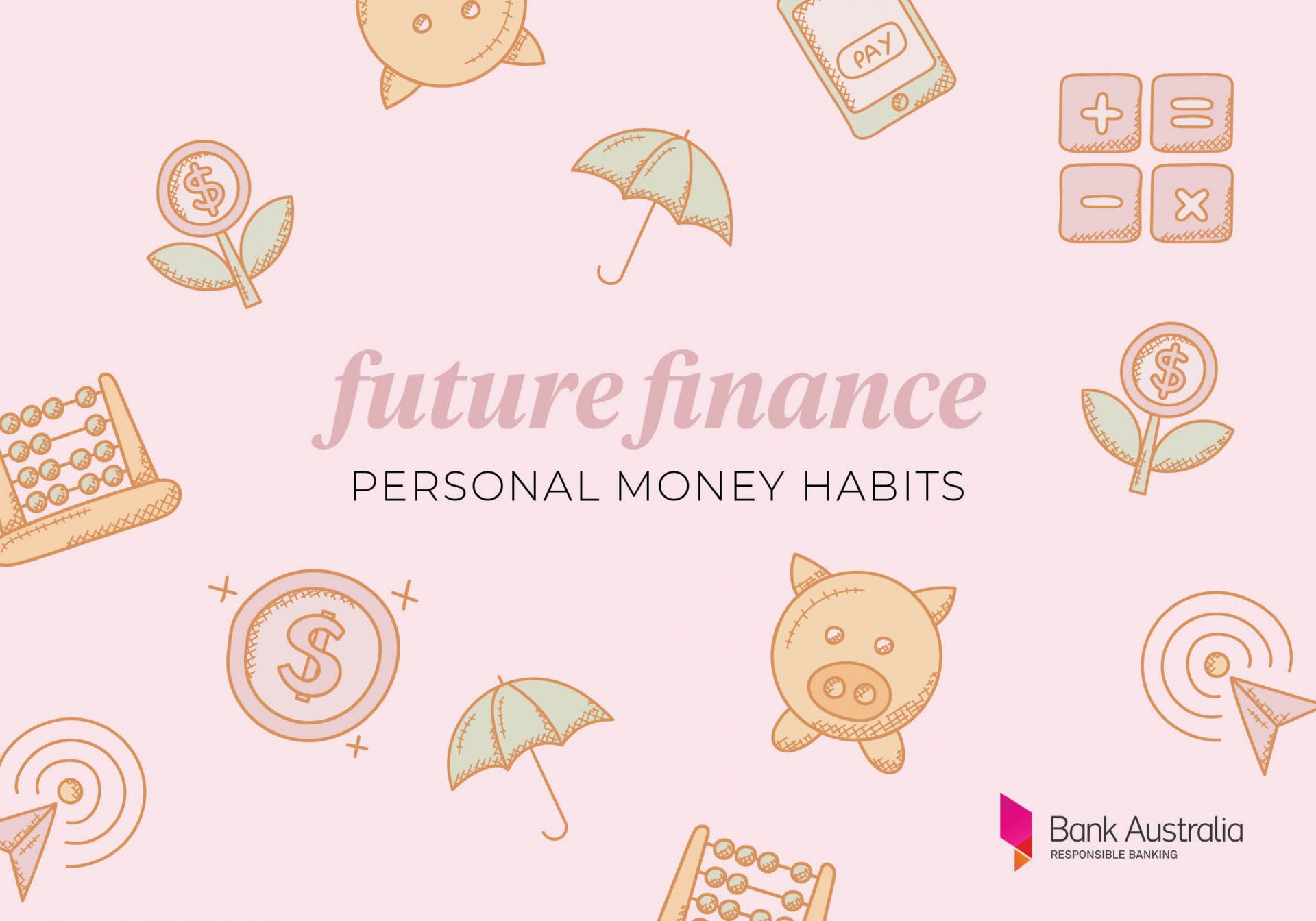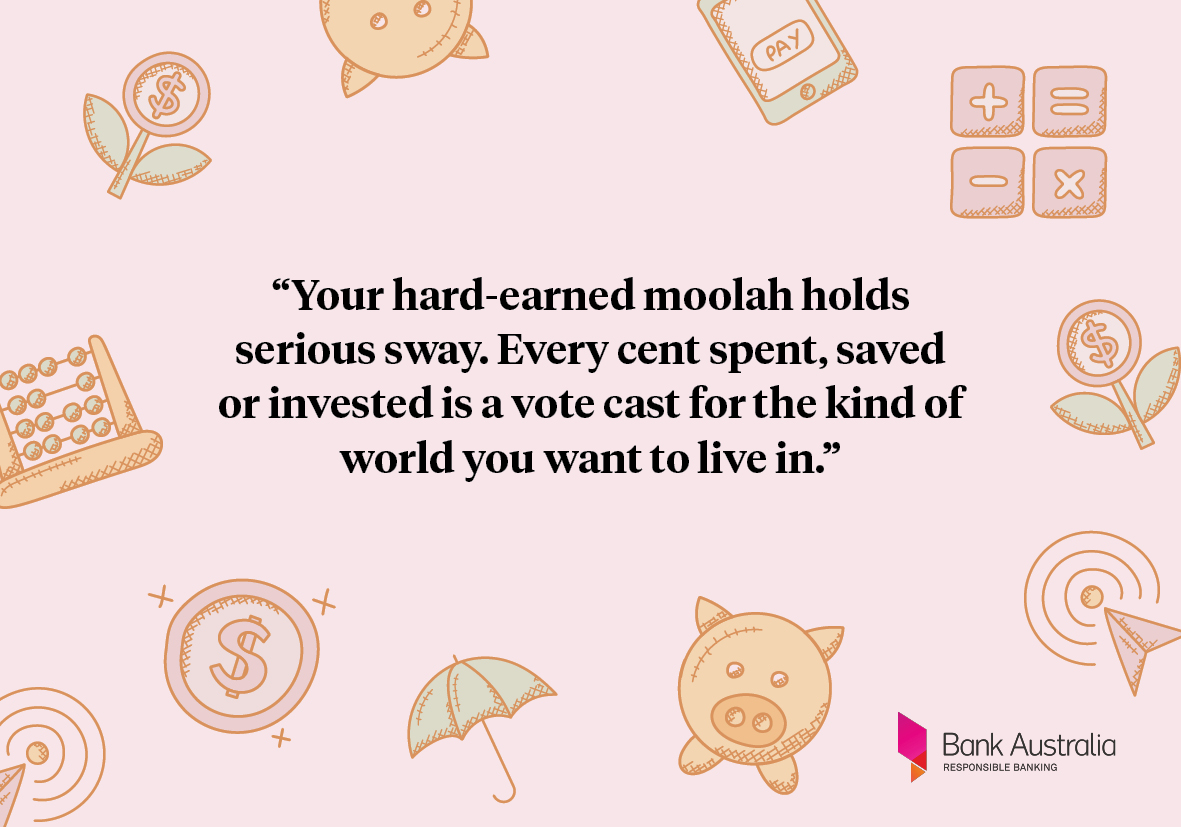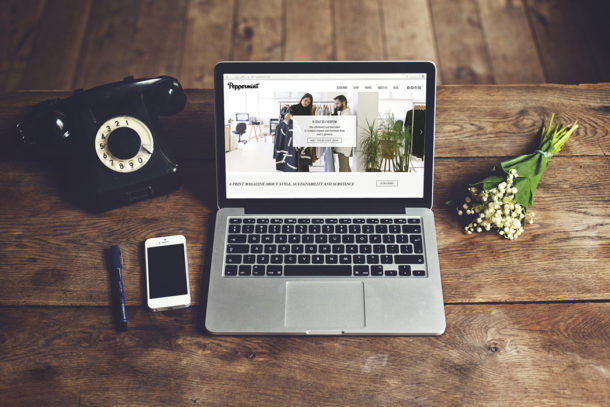
Future Finance: Healthy Money Habits
When it comes to living a more ethical and sustainable life, sometimes you’ve gotta put your money where your mouth is — literally. But talk is cheap and finance fickle, so in this four-part online series on ethical money, created in collaboration with our friends at Bank Australia, we’ve balanced the books so you can live a more balanced life and use your money as a force for good. The last in the series: healthy money habits.
……….
Personal finance is a topic that’s usually off-limits. But talking openly about your financial wellbeing shouldn’t be taboo. There’s never been a more opportune – or for many of us a more urgent – moment than now to get informed, re-evaluate our financial impact, and start cultivating healthy money habits.
Your hard-earned moolah holds serious sway. Every cent spent, saved or invested is a vote cast for the kind of world you want to live in. And as we’ve discovered throughout this Future Finance series, your money is working around the clock towards that end, even when it’s stowed in an account or fund.
Reaching your personal financial goals doesn’t mean having to compromise on your principles. To the contrary, making informed banking and investment decisions is one of the single most effective ways you can make a lasting difference.
Get educated, ask questions and demand more from our institutions – these are the first crucial steps to a more transparent, equitable and value-driven financial system. Banks and funds might do the heavy lifting, but it’s equally important to take personal responsibility for our spending and saving habits.
Just like exercising to keep healthy or meditating for mental clarity, fostering financial wellness is all about routine. Here are our thoughts on nurturing healthy money habits and putting your dosh to good use.
Free your mind
New research showing an uptick in financial anxiety in 2020, particularly among young people and women, comes as no surprise to many of us. But before the events of the past few months forced us to tighten our purse strings like never before, a shocking 60% of Australians still confessed to losing sleep over their finances. One in two of us don’t think we’ll have enough to retire comfortably when the day comes. How’s that for anxiety inducing?
The first step to building a healthy relationship with money is reframing the way you think about your finances. If money is something you prefer not to think about at all, it might be time to start engaging.
There are so many habits that will improve your financial health, but if you can do one thing differently, change the way you think about finances.
There are tons of resources out there that put a positive spin on financial literacy. Podcasts such as Money Power Freedom, a female-focused production created by the Victorian Women’s Trust in partnership with Bank Australia, and websites such as Oiyo, an easy-to-digest financial education resource based in Brisbane, are great places to start.
“There are so many habits that will improve your financial health, but if you can do one thing differently, change the way you think about finances,” says Suzi O’Shea, Oiyo’s Editor-in-Chief. “It can be stressful, it can be confronting, but if you change your mindset, get all the information and be proactive about your money choices, you will find you can get on top of your finances sooner than you think. Attitude is key. Remain positive and don’t let the thought of finances be daunting.”
Be open about money – don’t be scared to talk about it with your partner, friends and family. Read books, listen to podcasts and become comfortable with discussing it rather than sticking your head in the sand like most of us do. Ignorance isn’t bliss.
Choose your allies wisely
Unless you opt for an old school money-under-the-mattress approach, managing your finances over a lifetime isn’t something you can do alone. You need allies that share your vision.
It’s easy to feel disempowered when deciding who to trust with your cash – especially when there are more than 50 banks and 500-plus super funds on the scene. The financial landscape is dominated by numbers, rates and figures, but it’s equally important to take stock of the qualitative side of the equation. The why and how are just as important as the ‘how much’.
Determining who to bank with, who to rely on to steward your all-important superannuation, and where to invest are some of the most important financial decisions you’ll ever make. Institutions that value transparency and accountability and are underpinned by a strong ethical framework are becoming more popular as aligning your money with your values has never been more important.
At this point in time, one of the most powerful calls you can make is to divest from harmful and polluting industries including fossil fuels, and invest in clean energy, reforestation, and industries that offset your carbon footprint. Ensure your bank or fund of choice has measures in place to screen all its investment partners so you know exactly where your money is going. Market Forces’ assessment of 120 banks and their stance on fossil fuels is an excellent resource for comparing options.
Remember, your decisions aren’t set in stone. The world is changing, and with it ethical standards are evolving. Don’t settle for the status quo or the easy option. Remember there’s almost always flexibility to switch institutions, and it’s often much easier than you might think.
In the long term, reshaping our financial system requires a groundswell of individuals who are prepared to hold our institutions to a higher standard. If you’re unhappy with your current bank or fund, one of the most meaningful things you can do is directly and confidently approach them and tell them why. If you choose to change banks, tell your old provider in plain and simple terms why you’re moving your money.

Budget mindfully
Making informed, values-driven organisational choices is fundamental to financial wellbeing. But you shouldn’t underestimate the power of those smaller, everyday actions. Smart spending and finding ways to stretch your dollar further is another way to maximise your impact.
Attentive and realistic financial planning is one of the easiest ways to be the boss of your money. Knowledge is power when it comes to budgeting, and it starts with knowing exactly how much you spend. “Whether you’re in debt, saving for a big purchase or just keeping up with all the bills, having a plan in place reduces anxiety around what’s to come,” Suzi advises. “It also gives you a sense of empowerment.”
Incredibly, research shows that up to 86% of Australians don’t know their monthly expenses off the top of their head. No wonder only one in five of us report feeling ‘fully in control’ of our finances.
Map out your income and expenses, being sure to consider any regular giving to charities or causes you support, and any debts you have to pay down. Then you can start nutting out your discretionary spending.
If you’re new to personal budgeting, the 50/30/20 approach can be useful for figuring out how exactly your money should be split – 50% necessities, 30% wants and 20% debt repayment and savings. Check out the government’s Money Smart Budget Planner to work out where your money is going. Or grab yourself a copy of Scott Pape’s wildly popular book The Barefoot Investor, for his unique and independent take on how to get on top of your finances.
Spend consciously
A budget might look good on paper, but financial wellness requires being diligent with your dough on a daily basis. Conscious spending isn’t the same as penny pinching – it’s all about being frugal where it matters most and thinking about the broader impact of what you’re buying.
Start by defining your needs and your wants, setting clear boundaries around the essentials and the things you don’t really need, and thinking about your values in terms of the companies where you spend your money. If your goal is to boost your savings, look for ways you can trim the fat.
“If you spend two-full weeks tracking every single expenditure made, you will be quite surprised at how much you spend on things you don’t need,” Suzi advises. “You absolutely don’t need to be buying two lattes a day, you may have one too many handbags or perhaps your shoe collection is getting out of hand. Track your spending and ask yourself, ‘Do I need this?’”
Consider what makes you happy versus what’s a novelty and channel your discretionary spending towards experiences and things that bring you long-lasting joy. As of late last year, the average Australian made one unplanned purchase a week. Spontaneous spending might feel good in the moment, but remember it all adds up.
You absolutely don’t need to be buying two lattes a day, you may have one too many handbags or perhaps your shoe collection is getting out of hand. Track your spending and ask yourself, ‘Do I need this?’
Take stock of what you already own before you buy something new, thinking about not only your spending but the environment too. Tap into the many resources that are now available to swap, trade and buy second-hand. And when you do make a purchase, make sure you’re putting your money behind businesses with values you believe in. In other words, use your income efficiently.
Tracking your spending doesn’t have to be a painful process. There are a wealth of online tools and apps available that make it easier than ever to see how every dollar measures up.
As a starting point, you might want to download:
Your bank’s free app – many people overlook this, but having access to your balance when you’re on-the-go can be a game changer.
Pocketbook – Australia’s most popular personal finance app synchs to your bank account and is 100% free to use.
Goodbudget – uses the ‘envelope budgeting’ system to help you separate your monthly budget into categories.
Keep a cushion
As any financial planner will tell you, having a rainy day fund to draw on in an emergency is essential. One of the most proactive things you can do for long-term financial wellness is create a buffer to shield you from life’s predictable unpredictability.
In the past, most money experts have suggested keeping enough cash to the side to cover three to six months of regular expenses. Nowadays, the advice is to aim for six months’ worth of savings as a minimum – more if you can.
Regular automatic withdrawals every pay day and stowing your tax refund to give your emergency fund a boost are some of the strategies you can use. To avoid temptation, separate your cushion off from your regular spending account. Don’t feel bad if you have to dig into your emergency fund – that’s what it’s there for.
READ MORE FROM OUR FUTURE FINANCE SERIES
General advice warning: This information is general and does not take into account your objectives, financial situation or needs. You should consider whether the advice is suitable for you and your personal circumstances. Before you make any decision about whether to acquire a certain product, you should obtain and read the relevant product disclosure statement.
Our Future Finance Series has been created in partnership with our friends at Bank Australia. Want to align your money with your values? Head to their website to find out how you can use your money for good.


